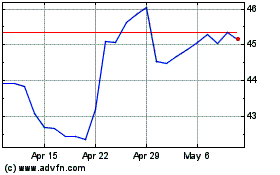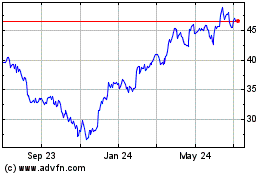By Andrew Tangel
President Donald Trump's plan to impose steep tariffs on steel
and aluminum imports drew sharp criticism Thursday from industries
that fear it could raise their costs to make everything from
airplanes to beer cans.
The bigger worry, some manufacturers and agricultural groups
said, is the potential for retaliatory measures by other countries
that could imperil U.S. exports and jobs.
Mr. Trump said his plan to impose tariffs of 25% on imported
steel and 10% on imported aluminum is needed to address what he
described as a trade imbalance benefiting other countries.
Companies that make steel and aluminum in the U.S. have in recent
years lobbied for the tariffs, which they say are needed to compete
with foreign competitors making metal at lower prices.
"We appreciate the President's commitment to strengthening the
U.S. aluminum industry," the Aluminum Association trade group said
Thursday.
It wasn't immediately clear what types of aluminum and steel
would be subject to new tariffs.
The impact on metals-consuming industries will also hinge on
whether the administration grants exemptions to some exporting
nations.
Some industries are already lining up for those exemptions. The
Beer Institute, a trade group, called for "cansheet" aluminum to be
excluded from any new trade barriers. "Imported aluminum used to
make beer cans is not a threat to national security," said Jim
McGreevy, the group's president.
Mr. Trump invoked national-security concerns as a reason behind
the administration's push for tariffs. Studies conducted by the
Commerce Department, made public last month, concluded metals
imports had eroded the country's ability to make its own weapons,
tanks and aircraft as well as other critical infrastructure.
Manufacturers in the defense industry rely on imports for only a
fraction of their steel and aluminum needs, and the Defense
Department said last week it wasn't concerned about the effect of
tariffs on the industrial base for military equipment.
But Remy Nathan, vice president for international affairs at the
Aerospace Industries Association, said higher costs and retaliatory
measures could disrupt global supply chains and hit exports,
denting the aerospace and defense industries' $86 billion trade
surplus last year. The group represents companies including Boeing
Co. and Lockheed Martin Corp.
"It's the indirect industrial impact we are most concerned
about," said Mr. Nathan.
Manufacturers and trade groups for some of the country's biggest
metals' consumers expressed opposition to the planned tariffs,
saying the trade barriers would increase their costs -- expenses
that may be passed along to consumers.
"It's going to be expensive," said Ed Bolas, chief financial
officer at DyCast Specialties Corp., a maker of parts for products
including cutting tools and engines. "All of it will impact the
consumer."
The Association of Equipment Manufacturers, which represents
heavy machinery giants Caterpillar Inc. and Deere & Co., said
new trade barriers will hurt American exports. Caterpillar
executives have said tariffs could drive up prices for domestic
steel and make it costlier for it to produce mining trucks,
bulldozers and other equipment.
Steel is the largest input cost for big machinery producers,
accounting for around 65% of raw material expenses at Caterpillar,
with aluminum adding another 10%, according to JPMorgan analyst Ann
Duignan. She estimates agricultural equipment makers such as Deere
are even more exposed to raw material inflation, unless they can
claw back costs through higher sale prices.
Polaris Industries Inc., which buys more than $300 million in
steel and aluminum each year to make off-road vehicles, snowmobiles
and motorcycles, doesn't expect tariffs to significantly increase
its costs, Chief Executive Scott Wine said Thursday.
But Mr. Wine said he was concerned that duties or retaliatory
trade barriers would lead other manufacturers or agricultural
companies to lay off workers that buy his company's products.
"President Trump has been a phenomenal supporter of jobs in the
U.S., and this would not be in line with his previous efforts," he
said.
A lack of clarity on how or whether the Trump administration
would impose tariffs has been frustrating, said Mr. Bolas, of
DyCast Specialties. The Starbuck, Minn.-based company has put off a
5% raise for its 58 employees this year because of the uncertainty
over how tariffs would affect its costs, he said.
Some auto makers and parts suppliers reacted to Thursday's
announcement with alarm. The Motor Equipment Manufacturers
Association, the chief automotive components supplier trade group,
said the new tariffs would endanger jobs and raise costs.
A lobby representing foreign auto and parts makers in the U.S.
also criticized the move and linked it to a broader White House
agenda of "risky renegotiations" for Nafta and other trade deals.
"The Administration's decision to impose substantial steel and
aluminum tariffs will harm the U.S. auto industry," John Bozzella,
CEO of the Association of Global Automakers, said in a
statement.
Not all auto makers signaled immediate opposition to the
announcement. General Motors Co., which buys 90% of its steel from
U.S. suppliers, said in a statement that it was reviewing the
details but "support[s] trade policies that enable U.S.
manufacturers to win and grow jobs in the U.S., and at the same
time succeed in global markets."
Meanwhile, farm groups feared Mr. Trump's move would invite
retaliation against U.S. crop exports, after China recently raised
the prospect of tariffs on sorghum, a grain used in livestock
feed.
"These [steel and aluminum] tariffs are very likely to
accelerate a tit-for-tat approach on trade, putting U.S.
agricultural exports in the crosshairs," said Brian Kuehl,
executive director of Farmers for Free Trade, a Montana-based group
set up to defend U.S. agricultural exports.
The farm group said a U.S.-Mexico dispute over trucking rules in
the late 1990s led Mexico to place tariffs on U.S. apples, cheese
and wine, while China placed a steep duty on chicken parts imported
from the U.S. after tariffs in 2009 were placed onto Chinese tire
imports.
"The agriculture sector knows from experience that our ag
exports are the first to be hit by retaliation," Mr. Kuehl
said.
--Doug Cameron, Jacob Bunge and Chester Dawson contributed to
this article.
(END) Dow Jones Newswires
March 01, 2018 17:17 ET (22:17 GMT)
Copyright (c) 2018 Dow Jones & Company, Inc.
General Motors (NYSE:GM)
Historical Stock Chart
From Mar 2024 to Apr 2024

General Motors (NYSE:GM)
Historical Stock Chart
From Apr 2023 to Apr 2024
